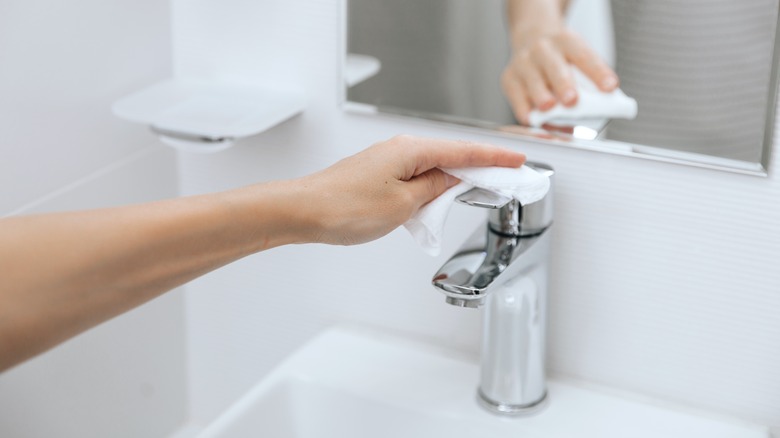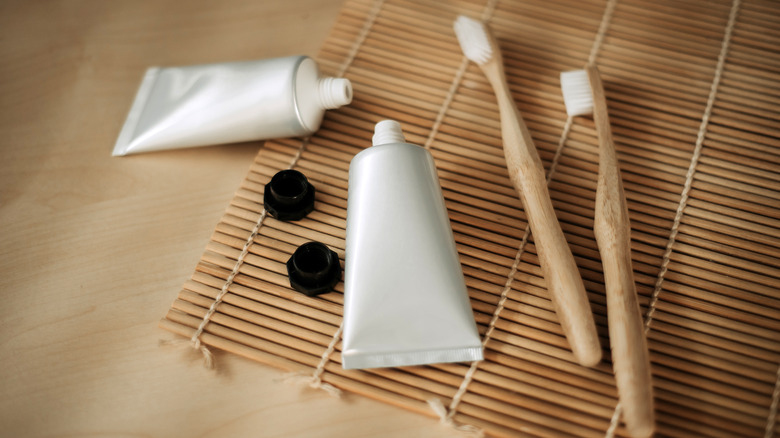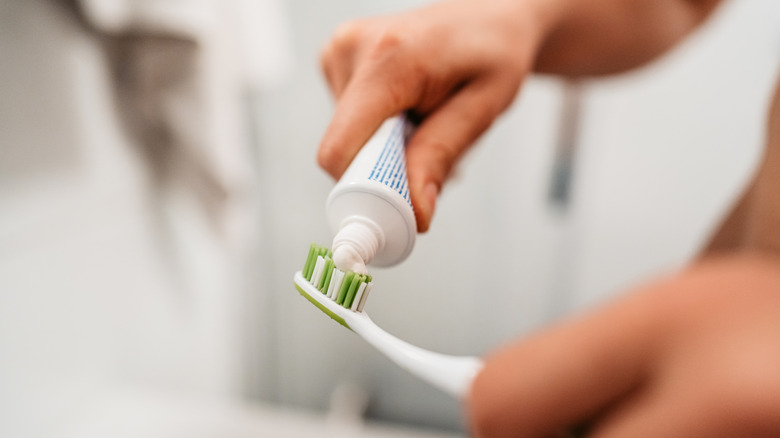The Hygiene Essential That'll Leave Your Bathroom Sink Spotless
Toothpaste, widely recognized for its oral hygiene benefits, doubles as an exceptional cleaning agent for bathroom sinks. Its efficacy in combating stains and grime stems from the same properties that make it excellent for cleaning teeth. Sinks, particularly those in frequent use, often lose their shine and develop a lackluster, dirty appearance. Over time, they gather a variety of stains and residues, such as toothpaste splatters, soap scum, and hard water marks. These blemishes can be tenacious, and standard cleaning agents sometimes fall short of eliminating them, leaving the sink far from its optimal appearance. Toothpaste excels in these scenarios, adeptly restoring the sink's brightness and eradicating unsightly rings or stains, particularly around the drain area.
One key advantage of using toothpaste for cleaning is its gentle nature. It ensures that surfaces aren't scratched or damaged during the process. The abrasive fine particles in the toothpaste, designed for cleaning and polishing teeth, are equally effective on hard bathroom sink surfaces and delicately scrub away stains without harming the sink's material. Furthermore, many toothpaste varieties are infused with whitening properties, adding an extra punch to their stain-removal capabilities. Beyond its functional cleaning benefits, opting for toothpaste as a cleaning agent is both cost-effective and eco-friendly. It serves as a viable alternative to harsh chemical cleaners and aligns with a more sustainable and health-conscious approach to household maintenance.
Why toothpaste works for effective cleaning
Toothpaste contains several ingredients that make it an effective cleaning agent, particularly for removing stains. Sodium bicarbonate, commonly known as baking soda, is found in non-gel white toothpaste. Sodium bicarbonate is a natural, mild abrasive that provides gentle scrubbing action, making it ideal for cleaning stains. It's produced through a chemical process involving sodium carbonate, water, and carbon dioxide, resulting in a versatile compound used in various applications, from baking to cleaning. The cleaning benefits of sodium bicarbonate in toothpaste are significant. It helps break down and lift away stains, leaving surfaces like your bathroom sink looking brighter and cleaner. It is also good for cleaning delicate materials like porcelain or ceramic, which harsher cleaning substances can easily scratch.
Additionally, toothpaste often contains mild detergents and compounds like sodium laureth sulfates that aid in dissolving grease and grime, further enhancing its cleaning power. Other ingredients include abrasives like silica, which help in scrubbing away tough stains, and small amounts of hydrogen peroxide, a known whitening agent that can aid in removing discoloration. All in all, the combination of these ingredients – abrasives for scrubbing, detergents for dissolving dirt, and mild whitening agents — results in a safe cleaning paste for most sink surfaces.
Using toothpaste to clean your sink
Using toothpaste to clean your bathroom sink is both easy and effective. To start, add a small amount of toothpaste to an old toothbrush; be sure to use the white, non-gel formula. Concentrate on scrubbing around the bathroom sink drain or discolored spots, using circular motions to lift and remove these marks effectively. Toothpaste is also great for cleaning bathtub drains, particularly those with a porcelain-enamel finish, helping to restore their original shine.
It's essential to be mindful of a few key points when using toothpaste for cleaning. After you've finished scrubbing, thoroughly rinse the area with water. This step is crucial because toothpaste can leave a chalky residue if not thoroughly washed off. Although this residue isn't harmful, it can mar the sparkling appearance of your sink. Rinsing well ensures that you reveal a spotlessly clean and shiny surface. Although toothpaste is mild and safe for various sink materials, including delicate ones, it's still a good idea to exercise caution and avoid using toothpaste on surfaces highly susceptible to scratches, as even mild abrasives might cause slight damage. While toothpaste works well as a stain remover and is excellent for light cleaning tasks, it may not be as effective against deep-set or very tough stains. You might need a more potent cleaning agent for these more challenging jobs.


